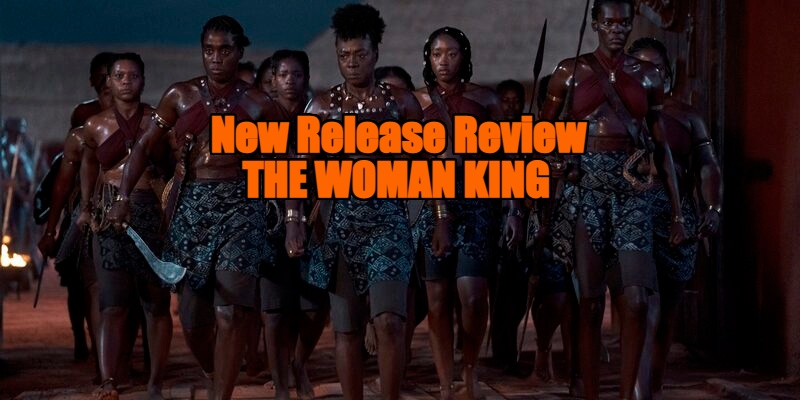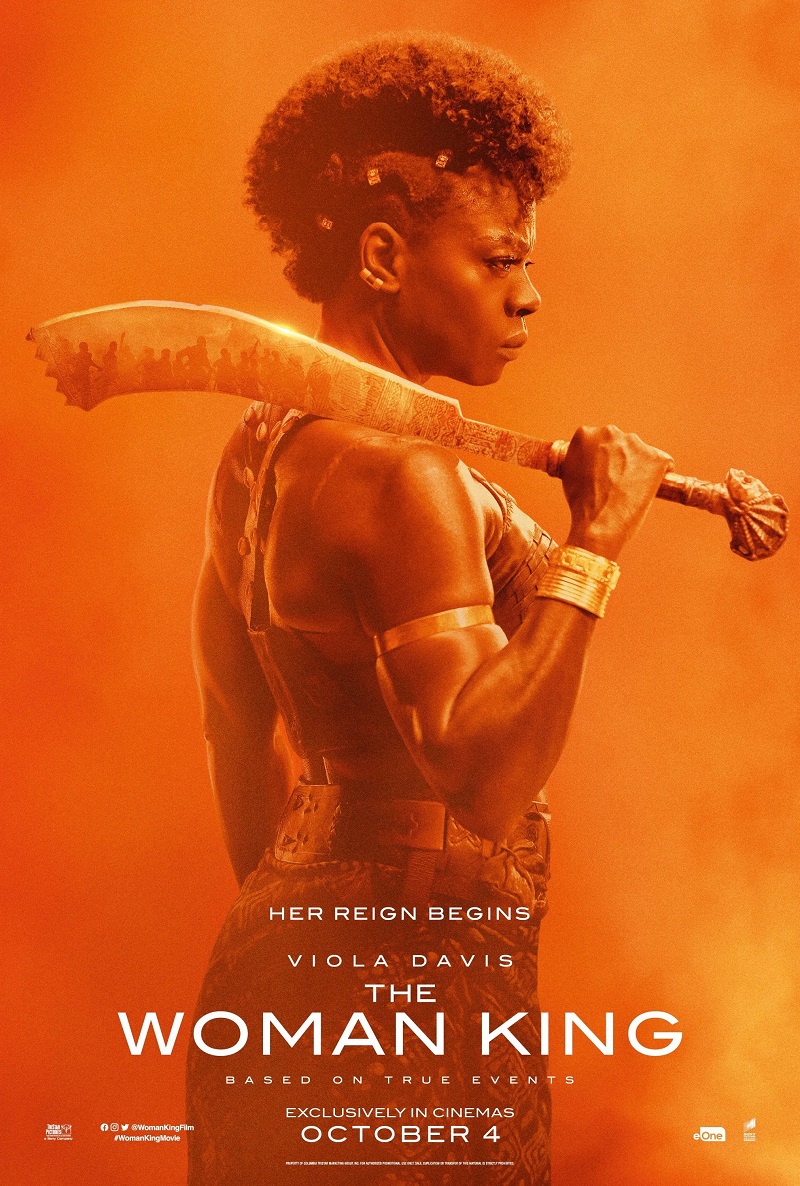
Review by
Eric Hillis
Directed by: Gina Prince-Bythewood
Starring: Viola Davis, Thuso Mbedu, Lashana Lynch, Sheila Atim, John Boyega, Jordan Bolger

If you're a woman over a certain age your choice of roles in Hollywood
are somewhat limited. For aging black actresses, a specific role has
developed in recent years, that of the hero's tough bureaucratic boss.
Viola Davis inhabited this role in the recent
Suicide Squad
movies, but with The Woman King she gets to play the hero
while her closed-minded boss is a young man.
Davis is Nanisca, the general of the Agojie, a battalion of women
warriors who serve under the king of Dahomey in 1823 West Africa. The
king is the young Ghezo (John Boyega), a Hugh Hefner type who
surrounds himself with beautiful women while lounging around in his
dressing gown. Ghezo makes a living for himself and his kingdom by
aiding the slave trade, selling captured opponents to Brazilian slave
traders. Nanisca believes that rather than selling other Africans into
slavery, Dahomey should exploit its natural resources like palm oil, but
Ghezo is having none of it.

Somewhat torn between a sense of loyalty and a disapproval of her
leader's philosophy, Nanisca nevertheless keeps her head down and gets
on with the business at hand, that of preparing a new crop of young
women to become warriors in the battle against the neighbouring Oyo
Empire, who have been raiding Dahomey for their own slaves to sell to
the Brazilians.
Hollywood has given us scores of historical epics down the years, but
never one set in this part of the world, likely because doing so opens
up the old wounds of slavery. The Woman King finds itself
in a difficult spot. How do you make a movie that pays tribute to a
group of women while also acknowledging that they were engaged in a
reprehensible practice? It's a question the film struggles to answer,
and what is ostensibly an action epic probably isn't the best medium to
delve into such a messy area. The movie asks you to overlook the fact
that the Agojie are involved in slavery themselves, because their form
of slavery isn't quite as bad as that of their enemies. That's not
really how it works though, is it? Slavery is slavery.

The Woman King should probably have been centred around
its heroine's attempts to convince her leader to end his role in the
slave trade, something the movie only barely touches upon. Instead it
focusses on soapy subplots that revolve around clunky revelations and
improbable romances. Surprisingly, Davis doesn't get half as much screen
time as you might expect, which is a shame as the movie gives her a
chance to add an extra dimension to the school principal persona
African-American actresses of a certain age have found themselves
pigeon-holed into in recent years. Watching her convince as someone who
could be both a tough leader and a sensitive mentor, I couldn't help
think what a great Star Trek captain Davis would make.
Davis shares much of the screen time with South African actress
Thuso Mbedu, who plays Nawi, a young recruit who initially serves
as the audience's way into this world but then gets lumped with a
romantic subplot that feels like it belongs in a Young Adult movie. A
dashing mixed-race Brazilian trader, Malik (Jordan Bolger), is
looking to discover his African roots and falls for Nawi in the process.
Their scenes jar against the more serious political themes, and it often
feels like the movie is desperate to soften its edges in order to become
a future high school staple. Far more involving are the scenes between
Nawi and Izogie (an effortlessly cool Lashana Lynch), a tough
warrior who forms a sisterly bond with the teenager.

Director Gina Prince-Bythewood does a far better job with
The Woman King's action scenes than those in her previous effort,
The Old Guard, constructing them in a manner that leaves us in no doubt that these
women could take down much bigger men with their physical prowess. I'm
not sure if the fighting style is accurate, as it comes off more like
21st century Hollywood than 19th century Africa, with moves straight out
of the recent Wonder Woman movies. While surprisingly brutal, the action
scenes are oddly bloodless; even when we're watching someone get
repeatedly beaten by a steel ball on a chain there isn't a drop of blood
spilled and the Agojie emerge from their battles looking unfeasibly
clean. A constant issue throughout the film is how characters get from
point A to point B, in both narrative terms (we really need a few extra
scenes to detail how some decisions are made) and geographical - a day's
walk for one group seems to take several days on horseback for another
while the three main parties keep popping into each other's territories
like neighbours borrowing milk.
Unfortunately there's no way to make a movie like
The Woman King in Hollywood without having its characters
speak English, but the use of the language really does undermine the
film's anti-imperialist themes. Not only do the African characters speak
English but they use European weights and measures in their speech.
There's one particular scene that falls flat when a Brazilian slaver
begins speaking in subtitled Portuguese to Ghezo, who commands his guest
to "speak in my language." What would have been a badass line if spoken
in Ghezo's native tongue just feels queasy, a reminder that ultimately
history is written by the winners and the winners now run
Hollywood.


